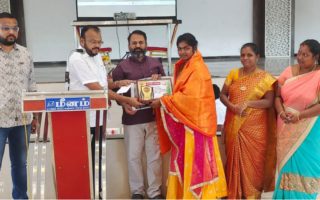In the tapestry of Indian culture, food transcends the mundane, weaving together strands of spirituality, tradition, and community. For centuries, Indian cuisines have not only nourished bodies but also souls, serving as an expression of divine love and communal unity. Akshay Mehndiratta, a passionate food blogger with a keen interest in the spiritual dimensions of culinary practices, embarks on a journey to explore the sacred kitchens of India. These are not just places where meals are prepared, but sanctuaries where food is sanctified through age-old rituals, offering a taste of divine bliss. With a heart full of curiosity and a spirit eager for enlightenment, Akshay Mehndiratta sets out to document how these sacred kitchens help forge an indissoluble bond between the divine and the devotee, blending culinary delights with spiritual awakening.
The Langar of the Golden Temple, Amritsar
The Golden Temple, also known as Harmandir Sahib, stands not only as the spiritual nucleus of the Sikh religion but also as a symbol of universal brotherhood. The temple’s history is a profound testament to the Sikh ethos of equality and communal service, epitomized by the Langar, a free communal kitchen. Here, anyone, regardless of background, religion, or social status, is welcome to partake in a meal that is as much a sacrament as it is sustenance. The kitchen is a hive of activity, buzzing with the energy of hundreds of volunteers who chop, cook, and serve meals to over 100,000 people each day. Akshay Mehndiratta, donning a headscarf and immersing himself in the role of a ‘sevadar’ (volunteer), shares his firsthand experience of the bustling environment. He narrates the rhythmic chopping of vegetables, the giant cauldrons simmering with dal (lentils), and the assembly line of volunteers rolling out chapatis. Through his eyes, we see the seamless orchestration of tasks, each volunteer a thread in the fabric of this communal tapestry, bound together by a shared spirit of devotion and service.
The Mahaprasad of Jagannath Temple, Puri
Jagannath Temple in Puri is not just an architectural marvel but a pivotal center of spiritual life in Odisha, India. This ancient temple, dedicated to Lord Jagannath, a form of Lord Vishnu, plays host to a unique culinary tradition known as Mahaprasad. Mahaprasad is considered divine, believed to be sanctified by the lord himself. The temple’s kitchen is one of the largest in the world and uses a centuries-old method where food is cooked in earthen pots stacked one atop another, over wood-fired hearths. This unique technique imparts a distinct earthy flavor that cannot be replicated elsewhere. The Mahaprasad comprises a staggering variety of dishes, ranging from rice, dal, vegetables, and sweets, each prepared according to strict religious codes. Akshay Mehndiratta marvels at the variety and the sacred process, noting how the communal sharing of Mahaprasad not only feeds the body but also nourishes the soul, reinforcing a sense of community and shared spirituality among the devotees.
The Annadanam of Tirumala Tirupati
Tirumala Tirupati, located in the Southern part of India, is one of the most venerated and richest pilgrimage centers in the world, drawing millions of devotees annually. Central to the temple’s ethos is the practice of Annadanam, a sacred offering of food that is believed to bestow blessings upon both the giver and the receiver. The temple administers a massive kitchen that operates daily, providing free meals to all visitors without distinction, serving as a manifestation of the temple’s commitment to equality and charity. The logistics of preparing meals for over 50,000 people each day are staggering. Ingredients are moved in tons, and huge cauldrons and industrial kitchens buzz round the clock. Akshay Mehndiratta participates in the preparation, astonished by the scale and the efficiency of the operations. He interacts with the kitchen staff and devotees, sharing meals and stories, which underscores the profound impact of Annadanam on fostering a sense of community and spiritual connection among the throngs of visitors. Through these interactions, Akshay Mehndiratta gains a deeper appreciation for the role of food in spiritual practice and community bonding.
The Nivedyam of Sabarimala Temple
Nestled amidst the dense forests and rugged hills of Kerala stands the Sabarimala Temple, a site of significant pilgrimage for millions of devotees each year. The temple is uniquely accessible by foot via a series of steps that pilgrims climb, reflecting their devotion and penance. Central to the temple’s rituals is the offering of Nivedyam, the sacred food prepared for Lord Ayyappa, the presiding deity, and then distributed among the pilgrims. The food, primarily consisting of simple yet nourishing ingredients like rice, ghee, jaggery, and spices, is prepared with meticulous care, ensuring purity in both substance and preparation. Akshay Mehndiratta, participating in the preparation of Nivedyam, is moved by the devotion embedded in these culinary practices. He assists in grinding spices and stirring large pots filled with sweet Pongal. This experience provides him a profound insight into how simplicity and devotion are interwoven in the offerings, embodying the essence of the temple’s spiritual ethos.
Conclusion
Throughout his culinary pilgrimage across India’s sacred kitchens, Akshay Mehndiratta has unearthed a profound connection between food, faith, and community. Each kitchen, with its unique traditions and practices, not only provides sustenance but also a spiritual nourishment that binds the community together. From the communal Langar of the Golden Temple to the divine Mahaprasad of Jagannath Temple, and the massive Annadanam of Tirumala Tirupati to the humble Nivedyam of Sabarimala, these experiences have deepened Akshay Mehndiratta’s understanding of the integral role food plays in spiritual practices. Reflecting on his journey, Akshay Mehndiratta realizes how these sacred kitchens are more than just places where meals are prepared; they are sanctuaries where food serves as a divine connection to the divine, fostering unity and spiritual growth among all who partake in it. His pilgrimage underscores the impact these practices have on individuals and the broader cultural fabric of India, reinforcing the timeless bond between nourishment of the body and enlightenment of the soul.




